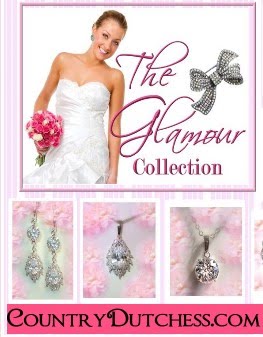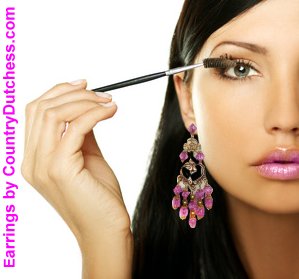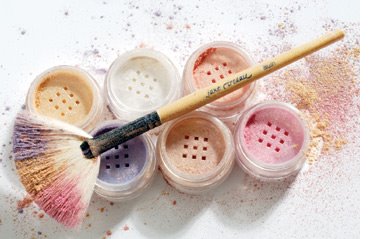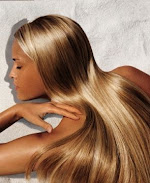 Earlier this week a bit of a “perfume bomb” exploded, when a top Canadian research team found that smelling good could be hazardous to your health. Here's what you need to know.
Earlier this week a bit of a “perfume bomb” exploded, when a top Canadian research team found that smelling good could be hazardous to your health. Here's what you need to know.
By Colette Bouchez
Could that luxurious scented bubble bath, scented bath gel or even your favorite perfume carry some ominous health risks? That's the suggestion of a new report titled "Not So Sexy: The Health Risks of Secret Chemicals in Fragrance". Released earlier this week as a joint project from the US-based Campaign for Safe Cosmetics, the Environmental Working Group and the Canadian-based organization known as Environmental Defense and it's been causing quite a stir.
According to the report independent laboratory tests conducted on a variety of products showed that at least 17 different formulations contained chemicals known as “hormone-disrupters” as well as containing sensitizing chemicals known to increase the risk of allergic reactions in many people. There were also reports that most of the questionable chemicals used in these products were not actually listed on the label – leaving most consumers in the dark about the health risks of products they regularly use.
Rick Smith, executive director of Environmental Defense told The Canadian Press that cosmetic manufacturers are allowed to do this because of an "outrageous loophole” in Canadian law.
"If you are a company making a fragrant product, all you have to do is stick the (word) 'fragrance' on the label and then you're exempt from any further disclosure of exactly what chemicals, what ingredients, have gone into making that fragrance," Smith said. The United States has such “similar” loopholes that allow pretty much the same thing to occur here.
The problem with this tact, says the new report, is that the “loophole” is too often used to hide a truckload of nasty chemicals that might otherwise discourage consumers from using these products.
Not surprisingly the Personal Care Products Counsel issued a blistering rebuttal when Chief Scientist John Bailey said the report “grossly misrepresents the science on fragrance ingredients and presents a distorted picture of how they are regulated and labeled”. Bailey, who few know was the former director of the US Food and Drug Administration’s Office of Cosmetics and Colors also stated that the report does a disservice to consumers looking for accurate and reliable information and advice about the products they purchase.
Women Over 40: Cancer Risks You Can't Ignore
Among the greatest concerns about the questionable ingredients is that many are deemed to be “endocrine disrupters” – chemicals that, once ingested by the body begin to act much like a hormone. When this occurs the chemicals bind to hormone receptors in our body, thus “tricking” our system into believing the real hormone is present, and in doing so initiates a number of “false signals” that in turn cause other hormonal and chemical activities to occur. This is often the case with endocrine disrupters known as “xeno estrogens “ – chemicals which, essentially, mimic the role of estrogen in our body and in doing so can throw our reproductive chemistry into a tailspin.
When we are in our reproductive prime this activity can cause changes in the menstrual cycle and ovulation that are significant to dramatically delay conception. Indeed, the effects of some chemical exposures may be strong enough to cause infertility or miscarriage – sometimes occurring at such an early stage a woman does not even know she is pregnant.
In it’s most destructive form these same exposures, particularly long term, may increase the risk of some female cancers, particularly in young women.
“For example, we know that when the adolescent breast is developing the cells are most susceptible to damage – so the chemical exposures a young girl receives could be laying the groundwork for breast cancer to develop later on in life – for some young women as early as their 30’s or 40’s,” says Dr. Julia A. Smith, Director of the Lynne Cohen Breast and Ovarian Cancer Prevention Program at the NYU Cancer Institute in New York City, and Director of the NYU Cancer Institutes Breast Cancer Screening and Prevention Program.
So, does this mean that we gals over 40 and well past our reproductive prime can just spritz and lather away without a care in the world? The answer is “no”. You do need to care – and here’s why.
One of the major links to several female cancers - including breast and endometrial cancer – is unopposed estrogen. It’s one of the reasons why HRT – hormone replacement therapy – fell so far out of favor when the massive Women’s Health Initiative studies found links between hormone therapy and cancer.
In this respect, it stands to reason that any chemicals which might act like an estrogen in a young woman’s body - to the point where it can interfere with her reproductive system or even increase her risk of breast cancer - are certainly potent enough to elicit an estrogenic-like response in women past their reproductive prime. And doing so, say experts, just might put us all at higher risk for those estrogen-related cancers.
“There isn't enough proof at the moment to make a solid public health recommendation regarding the effects of these chemical contaminants on cancer risks for older women, but there certainly is a smoking gun - and it's pointing at many of the most common personal care items on our bathroom vanities,” says Smith.
But before you chuck your favorite perfumes, shower gels and ( heaven forbid hair products) simply because they might contain hidden and harmful chemicals, there is another way.
Indeed, what Smith and an increasing number of experts now recommend is a much smarter approach – one that takes both the negative and positive aspects of our life into consideration, and then urges us all to go for the balance.
“When it comes to diseases like cancer, it is the cumulative exposures that matter most – the total sum of not just what you do wrong, but also what you do right – in the end that is what creates your personal ‘greenprint’ for healthy living ,” says Smith.
By cutting down on the “bad” exposures when you can, and more importantly, increasing the good (Eat healthy, get lots of exercise, strengthen your immune system with adequate rest and reduce stress when and where you can) Smith says you can create a “balanced life “ - one that allows you to "enjoy what you really like and feel good about what you’ve chosen to eliminate from your life.”
So, go ahead and use that favorite fragrance, shower gel or body lotion you love … just be sure to eat all your vegetables when you do! As with all things in life, the power of good health lies within the boundaries of balance and moderation.
Copyright ElleMedia Network 2010 - All Rights Reserved. In addition to US Copyright, the text of this RedDressDiary article is licensed under a Creative Commons Attribution-ShareAlike 3.0 License. All formatting and style elements of this page are not available under this license, and Colette Bouchez retains all rights in those elements.




































No comments:
Post a Comment